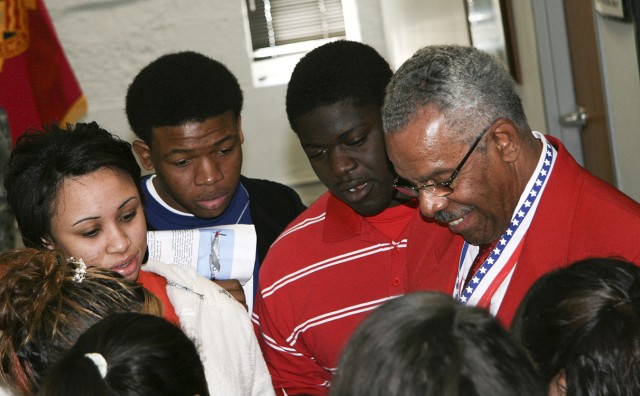
With his easy tone and quiet humor, a Tuskegee Airman and recipient of the U.S. Congressional Gold Medal, spoke of the hardship and sacrifice he and fellow African-Americans endured while in service to their nation during World War II.
The U.S. Army Sustainment Command hosted its annual Black History Month observance Feb. 4, at the Blackhawk Conference Room on the Rock Island Arsenal, Ill. Special guest Donald Elder spoke at the public event aimed at enhancing cross-cultural awareness among all Soldiers, civilian employees, and their families.
Elder, one of the original Tuskegee Airmen, was a corporal and a crew chief for the P-47 Thunderbolt, in the nation's first black U.S. Air Corps unit, the 99th Fighter Squadron "Red Tails."
Named after the air base they trained at in Alabama, the Tuskegee Airmen faced the daunting task of proving themselves capable pilots and Soldiers at a time when the nation and Congress still accented discrimination. Segregation and unfair treatment were commonplace in the military at the time.
"Separate, but equal, as they say," said Elder. "It was separate, but unequal. We were just treated with such indignity."
Elder recounted his first encounter with discrimination in the military when he reported to basic training at a military installation used to house German prisoners of war in Indiana.
"At that time, they had some 5,000 prisoners of war there," he said. "The prisoners of war were treated much better than us. They slept in barracks and we slept in tents across the road."
Events like this didn't harden the man or evoke bitterness. Elder merely shrugged it off as a life experience.
"You have to be able to talk about where you've been to talk about where you're going," said Elder. "(We were) just a bunch of good ol', red-blooded American boys who were in the military to fight for our country."
Following his Army service, Elder began a 33-year career with Rockwell International Inc., then served as chief of labor relations for the State of Ohio Department of Rehabilitation and Corrections.
After retiring as deputy director of administration in 1994, Elder was the manager of diversity for Bell Helicopter Textron in Texas until retiring in 2004. Now he serves as president of the North Texas Industry Liaison Group and is self-employed as a human resources consultant.
Among those attending were Moline High School students, invited by Sgt. 1st Class Nicole Morris, the ASC Equal Opportunity adviser.
"When I bring a speaker like Mr. Elder here, I try to get some of the local schools to bring some of the kids so that they can experience what's happening at the arsenal," said Morris.
Morris said she was amazed after hearing some of Elder's stories about the difficulties the Tuskegee Airmen endured.
"What [also] really amazes me is the programs that are out there for the children and for the future," said Morris.
During Elder's presentation, he shared several success stories highlighting a pilot instruction program, the Claude R. Platte Future Pilots Flight School, based in Dallas, Texas, available for troubled teens.
The program is designed to inspire discipline and bring focus to their lives and to increase minority contributions to the aviation industry. Elder is the honorary chairman for the youth aviation program.
For Elder and the Tuskegee Airmen of the 99th Fighter Squadron, the sacrifices they made and the discrimination they endured, paved the way for desegregation of the U.S. armed services in 1948 by Executive Order 9981, signed by President Harry S. Truman, and ultimately, as the nation witnessed Jan. 20, the inauguration of Barack Obama as this country's first African-American president.
"On January 20, 1949, I walked down Pennsylvania Avenue for Truman's inauguration," said Elder. "Some 60 years later, I had the privilege of going back to another inauguration that I never dreamed in my age would happen. This time, I was invited and sat in the reserved section."

Social Sharing